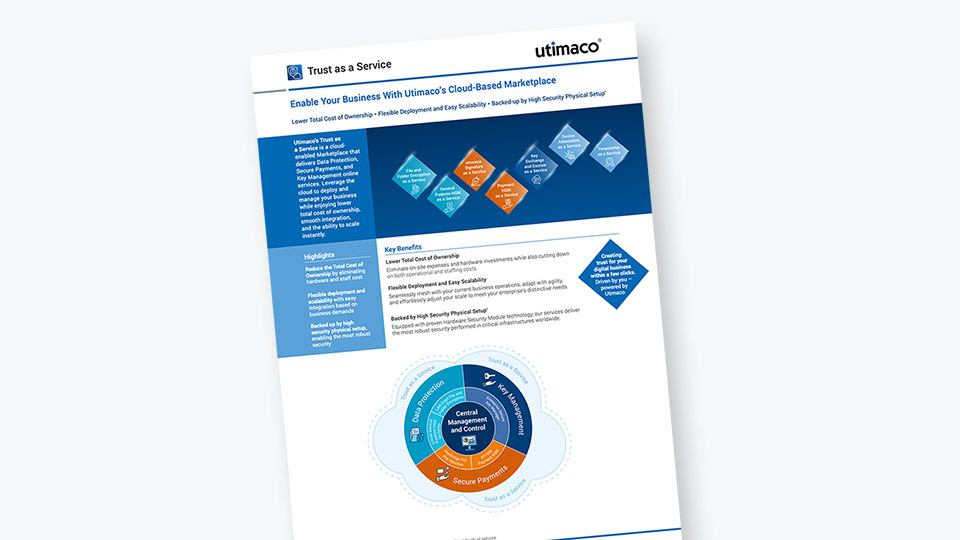The Cloud has become a cornerstone of our digital lives, both personal and professional. Yet, despite its widespread adoption, severe breaches continue to show the risks of relying too heavily on cloud providers’ built-in security. In recent examples, attackers exploited leaked credentials and vulnerabilities in cloud infrastructure, leading to major data leaks:
- Over 158 million AWS secret key records leaked and used for ransomware attacks
- Oracle Cloud Data Leak facing up to 2,000 German victims
- Snowflake breach impacting companies like ticketmaster, Santander and AT&T
These incidents highlight a critical need: maintaining digital sovereignty even when using cloud services.
Leading cloud providers are acknowledging their users’ concerns. To enhance customer trust and avoid reputational damage, they increasingly support digital sovereignty through partnerships with cybersecurity vendors like Utimaco, offering users greater control and transparency.
In this blog post, we’ll explore what digital sovereignty means across different levels and how to achieve it with the right cybersecurity strategies.
What is Digital Sovereignty?
Digital sovereignty refers to the ability of individuals or organizations to maintain full control over their digital assets. In the context of cloud computing, this means managing and protecting your data, retaining the freedom to switch providers, and maintaining transparency and autonomy over the tools and infrastructure in use.
Digital sovereignty can be broken down into three key levels:
Level 1: Data Sovereignty
The ability to control your own data and keys in the cloud and prevent unauthorized access.
Achieved by: Implementation of strong encryption combined with external key management.
Level 2: Operational Sovereignty
The freedom to operate independently from your cloud provider, avoiding vendor lock-in and enabling flexibility in technology choices.
Achieved by: Using cloud-agnostic multi-cloud solutions and interoperable technologies that rely on open standards and APIs, allowing easy integration and migration between platforms.
Level 3: Technical Sovereignty
The ability to maintain control over cloud-hosted software or applications by utilizing standard-based platforms and the possibility to migrate data whenever needed.
Achieved by: Thorough cloud service evaluation for openness, interoperability, and long-term data portability.
Learn more about cloud sovereignty in our webinar: Discover the Gold Standard for Cloud Security
Cybersecurity Strategies for Full Data Sovereignty in the Cloud
Data Encryption
Encrypting data transforms it into unreadable ciphertext, accessible only to those with the correct encryption keys. While most cloud providers offer built-in encryption, relying solely on their solutions can be risky, especially if key material is compromised.
Best practice: Use an encryption solution independent of your Cloud Service Provider to enhance autonomy and distribute risk. Keep root encryption key in your control.
External Key Management
Encryption is only as strong as its key management. The rule of thumb is: “Never store your keys with your data”. Use an external key management system that handles key lifecycles and stores keys separately from your data.
In cloud environments, two models support this approach:
- Hold Your Own Key (HYOK): individuals or entities retain control over their encryption keys rather than delegating that control to a third party.
- Bring Your Own Key (BYOK): individuals or organizations bring their own encryption keys to secure their data in cloud environments.
Reliable Key Generation and Storage
Strong cybersecurity depends on the quality and protection of the keys themselves. The gold standard here is using a Hardware Security Module (HSM) as Root of Trust (ROT): A tamper-proof device designed to securely generate, manage, and store cryptographic keys.
Using a built-in true random number generator (TRNG), HSMs create high-quality keys and ensure they remain protected. Private keys never leave the HSM unencrypted, making unauthorized access impossible.
Learn more about cloud sovereignty in our webinar: Discover the Gold Standard for Cloud Security
Utimaco: Creating Trust in the Cloud with Leading Partners
Utimaco collaborates with major cloud providers to strengthen digital sovereignty:
These partnerships enable users to integrate Utimaco’s encryption, key management, and HSM solutions to create a more secure and sovereign environment. Utimaco’s cybersecurity solutions are available both on-premises and as-a-service, supporting full multi-cloud strategies and delivering the flexibility and security today’s organizations need.







